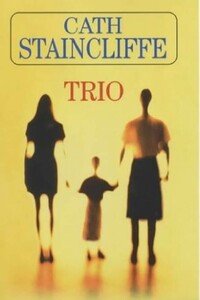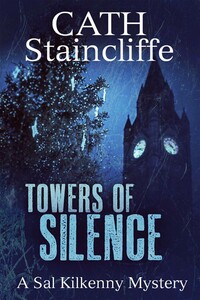‘Mr Barnes? Mrs Barnes?’ Introductions, handshakes, then Martine and Val went one way and a policeman called Neville Long settled Andrew in a meeting room. It was kitted out with sofas and easy chairs, rugs and coffee tables. No posters on the walls; just prints, wispy landscapes.
Neville Long was a bulky man with a full beard and large plump hands, tiny feet, Andrew noticed, really small. Small as Val’s? Jason was a 12, bigger than Andrew, who took size 10.
‘Mr Barnes.’
‘Sorry.’ Had he missed something? ‘My concentration…’
‘When did you last eat?’ the man asked him.
‘I’m not hungry.’
‘Have some tea.’
‘I don’t…’
‘Try.’
He went off and came back carrying a tray with two mugs of tea and a plate of mince pies.
‘Please help yourself.’ Neville Long took a mince pie, prised it out of the foil case and bit into it. Pastry crumbs scattered on the coffee table. He adjusted a file on his knee. ‘I want to take a formal witness statement, get all this down in writing. Yes?’
Andrew nodded.
‘Then we’ll look at what you can give us in the way of detailed descriptions. Perhaps you can start by telling me in your own words exactly what you saw.’
‘I was in the shower,’ he began. He felt the lump in his throat, the band tighten on his Adam’s apple. He shifted, coughed and dragged the sounds out, every sinew in his body stretched taut, his muscles rigid. His account was halting, trying to convert the slideshow in his head into phrases and sentences. ‘And then?’ the detective kept prompting. And then? And then? And then? Until he had forced Andrew out into the snow and that ghastly mess on the ground, down the street after them and back to Jason’s anguish, I think he’s dead, and into the living room and Jason pale, swaying, Andrew knowing he was ill, Jason falling, blood on his coat, all the way to the quiet hospital room where his son’s body was laid out.
Neville Long asked him to describe the three attackers and he did as best as he could: their clothing, height and build, colouring, features, but what he could recall seemed pitifully little.
After that he was taken through to a small office to work with the technician on the e-fit. The man navigated through the software, constantly asking Andrew to choose between different options, everything from the arc of the eyebrows to the cast of the complexion, the width of the chin to the shape of the nostrils.
Each time the technician would drag items on to the face in the centre of the screen: ‘Like this?’ he’d ask. ‘Or better like this?’ and click and drag an alternative. It reminded Andrew of the eye test at the optician’s, and like that, he often found it hard to judge which was the best version.
‘I didn’t get a very clear look,’ he kept saying, or ‘It was just a glimpse’ and ‘I honestly can’t remember.’ His head ached with the effort of concentration and there was a sickening pulse of pain in his temples and behind his eyes.
When they had finished, he was unsure whether the three pictures were a true likeness of any of the youths. The boys felt like caricatures: the round eyes of the one who’d been by the gate too bulbous, the peaky, feral face of the one he’d seen Jason shove just a lazy shorthand for his impression of the scrappy-looking lad (poor and wild), and the girl, he could barely remember anything of her beyond the coat, he didn’t even know what colour her hair was. She looked like any of a million teenage girls and the e-fit of her was as bland as a Barbie doll.
He hoped Val could remember more.
Would their parents recognize them, their friends? With dismay or disbelief or fury? He tried to imagine what that might feel like: to have a child gone so wrong, a child you were appalled by, ashamed of. All the hopes you had for them strangled, their actions violent and ugly and now made public.
Violence breeds violence. He knew that and understood that kids who ended up in serious trouble invariably had very dysfunctional backgrounds. There had been a baby in the neonatal ICU when Jason was born, in the next ventilator. No one seemed to visit the little girl, and Val heard the staff talking and pieced together the story. The father had beaten his wife so badly that she’d gone into premature labour. The baby, should she survive, was also deemed to be at risk. The abusive relationship had lasted many years; another child was already in care. The mother was being given support, but unless she agreed to leave the father, the baby would be taken into care with a view to adoption.




